Most of us in this club have similar mentalities. Therefore most of us are no stranger to pushing through some sort of pain in our workouts and races. This mentality validates and celebrates those who experience some sort of setback then comes back swinging. This “never give up” attitude inspires not only those around us, but motivates ourselves; setting the goal even higher each and every time.
Some of us like the road, others prefer the trails. Many mix it all together. Many of us like gadgets, but some prefer the basics. Some of us were athletes all of our lives, many of us started well into our mid-life crisis. Some of us participate, some of us win.
We may all have differences in sport, gear, pace, and history; but there is one commonality.
What is that commonality, you ask? Well, as a graduate of Hesser College with an Associate Degree in Psychology, my professional opinion holds absolutely no 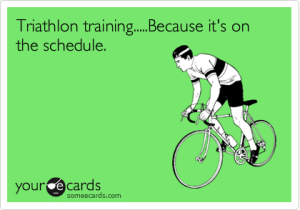 weight. But as a fellow multi-sporter, I’m not afraid to say that “thing” we have and share that connects all of us multi-sporters is that one very special thing; a pinch of crazy.
weight. But as a fellow multi-sporter, I’m not afraid to say that “thing” we have and share that connects all of us multi-sporters is that one very special thing; a pinch of crazy.
Now don’t get all riled up. I am not talking about the Clockwork Orange kind of crazy. I’m talking about that itty-bitty nuttiness we all share. That “thing” we have that kicks in when we fall flat on our faces (sometimes literally) just to get back up and keep moving forward, even when it hurts.
That “thing” is magic, but can it also make us set potential issues aside in order to continue to swim, bike, and/or run?
“My doctor is only going to tell me to stay off it, so I’m not going to the Doctor”. “That person I know had an injury that was way worse and they kept going”. “If I stop now I will lose all of my fitness and have to start all over again”. “But I’m signed up!” “Three more miles isn’t going to kill me, I’ll just put my compression on later”. “It’s probably nothing”. “Everyone will know I’m not doing anything”.
Sound familiar?
Our ability to push through separates us from the rest of the world. Being that itty-bitt-nutty is a compliment to each and every one of us because we warrior through the ups-and-downs of life like a boss. We get up at 4am to be more physically active by 7am then the general population is all week. We multitask. We are on top of our nutrition. We make sleep a priority. We are in tune with our bodies. And we do all of this while balancing work, family, and the many stressors that 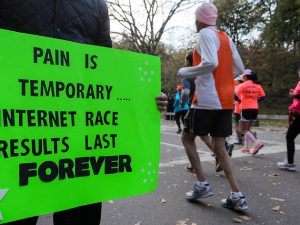 come with both.
come with both.
But can this widely respected ability to push through physical and mental anguish can also be a hindrance to healthy bodies and minds?
To get some answers I turned to a handful of new and old Northeast Multisport members.
But first, a bit about me and why I chose this topic. For those of you who know me and are sick of this story, just skip a few paragraphs. It picks back up.
Painful and debilitating episodes of lower-back pain was pulling me out of life for a week at a time. Once they became more frequent and more intense, I was finally seen by a neurosurgeon who told me “your back is broken”.
My response? “But I’m registered for Ironman!” (a prime example of the aforementioned itty-bitty nuttiness).
He allowed me to race until I couldn’t manage the pain anymore. 11 months post-diagnosis, with that Ironman under my belt, my body began to refuse me and my push-through-attitude and I checked in to the hospital for an L5/S1 fusion.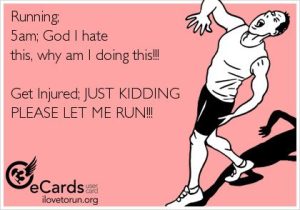
My surgeon could do these with his eyes closed (though I asked him not to). He is rated as one of the top-NH-docs, had a great bedside manner, but most importantly, he understood my athleticism was my coping mechanism to combat mental illness. This girl’s gotta’ run.
I trusted him completely, especially when he said 98% of folks who have this surgery are pain-free within 6 months. He even gave me many examples of patients who regained their athletic ability, sometimes stronger, post-op.
I figured I’d put my feet up a bit, catch up on Netflix, and eat snacks. Well, apparently I am of the 2% who’s body takes its own sweet time to heal. Six months post-up has turned into twenty months and my spine is still not fused. This causes me chronic, often acute, back pain. I can’t sneeze, lay down, sit, or bend over without pain: not an ideal situation for triathlon success.
You know when you buy a red car you suddenly see red cars everywhere? That’s what happened to me. I started to recognize fellow athletes doing exactly what I was doing. Trying to figure out what was pushing too little and what was pushing too much so we could find our middle; desperately wanting to be that same athlete as we once were and could become.
Whether it’s an injury, a disease, chronic pain, or mental illness, it’s still a barrier not only to training, but to reaching our ultimate goals.
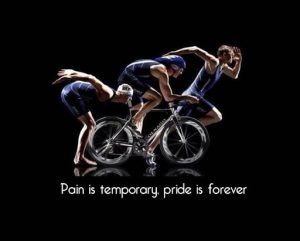 So how do we challenge and plow through those barriers? We push through. But at what cost?
So how do we challenge and plow through those barriers? We push through. But at what cost?
“Pushing through injury can cause us to break down physically and mentally” said one of our club members when I posed this question to them, “how much is too much?”
Having 30 plus years of sports I broke myself down a lot. In the back of my mind was always the reality of having limited time so I would just keep going to do as much in this life as possible. I would go as hard as possible, ultimately leading to depression and anxiety once my physical body could not keep up with my emotional desire to set and reach goals. As this all caught up to me I started to ask myself “why me”.
I’ve recently put a lot of effort into practicing the art of backing off of my physical activity without guilt. Honestly, at times, I feel I have failed as the pain from my knee, which is bone on bone, keep me from my physical activity. I want to set an example for my kids, so not being able to perform at the level I expect myself to, crushes me.
I could have written that myself, though I didn’t. And the more club members I spoke to, the more their stories sounded similar.
An injury can play mental games with you. Whether it’s something routine and embarrassing (like spraining your ankle a month out of Ironman while taking a picture), or something that has slowly built over time (which you most likely ignored because hey, it’s probably just your IT Band), regardless it seems a lot of us start asking ourselves the same questions.
“Am I just whining?”
My brain is loud when I’m injured and unable to maintain my physical ability. I dragged my seemingly lifeless foot around on my 1/8th mile walks wondering if I would ever rehabilitate back to proper form and gait, let alone get back to training at full capacity and getting back to triathlons.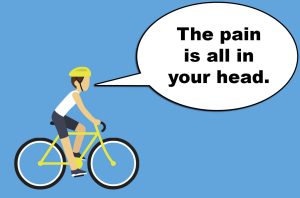
I wondered if I should even consider attempting to run again. “Maybe I should focus on cycling and swimming?”
I found myself scrolling through Strava (with jealousy) giving kudos to support my fellow athletes but hated the position I was in. Dealing with depression and wishing I could do more than small walks was absolutely brutal and extremely hard to accept.
“Do I really need to take time off?”
My biggest injury was a femoral stress fracture. Before then, I would push through injuries until I literally couldn’t run. I would push too much. I was the textbook example of “too much, too soon, too fast”.
I learned that you can ignore pain and other signs for a time, until your body forces you to stop. It was that experience that prompted me to start working with a coach, because I knew I needed someone to help prevent myself from injury and overtraining.
Having a coach to help make decisions for me is the best thing I could have done for myself. I tell my coach right away if I’m hurting then my coach decides what I’m going to do. If left to my own devices I will likely make the wrong decision.
“Shouldn’t I just STFU and push through it?”
To keep myself in check I consciously remember my stress fracture and all the challenges I faced. There’s fear of repeating an injury at that level, so that fear is a good thing for me to have. On the flip side, I still struggle deviating from “the plan” even when I’m fatigued or hurting. I struggle with feelings of inadequacy and failure sometimes but being aware of this and being honest with myself (and my coach) helps me to balance too little and too much.
 Everyone I asked to contribute to this piece expressed the importance of recognizing the mental and emotional challenges we face when taken out of our routine and having to sideline our goals.
Everyone I asked to contribute to this piece expressed the importance of recognizing the mental and emotional challenges we face when taken out of our routine and having to sideline our goals.
Exercising (especially running) is really my thinking time, clearing my head, working through problems, I really miss it if I can’t do it for one reason or another. If I can’t for longer periods of time I have problems sleeping (when I crashed badly four years ago and pretty much couldn’t do anything for months, I was having significant insomnia), and even just headaches, maybe from not having a vent for stress or something. Finding something to do, no matter how small (I just went for long walks once I was able) really helps with those kind of things and just feeling depressed in general.
For some of us, it isn’t physical injury that sidelines us. Sometimes it’s stressors that take us out of the game. Other times, the universe lines up and when we think we’re out, someone asks us to join a club which helps make it all better.
I suffer from anxiety and depression and recently went off my meds because my husband and I are trying for kids. Only a month after the decision to be medication-free, I was laid off. I had given up my coping mechanism (medication) to avoid it interfering with our dreams of a family and then suddenly I was also unemployed.
I decided to focus on a different coping mechanism; being active. I reverted back to what makes me feel calm. The first thing I did was go for a swim and a bike ride. I kept this going for the entirely of my unemployment. Simultaneously, I came across Northeast Multisport. A fellow member came on a group ride I was on through my gym. He reached out to me and said, “Hey, join NEMS! It will give you the motivation to get out and move!” For this, I am forever grateful..
I may not have had an injury that set me back, but I feel mental and emotional setbacks are just as powerful and difficult to overcome. I got depressed and couldn’t shake it a fair bit of time, but when I was moving, I was clear. I’ve learned you have to allow yourself to be dark for a bit. Let yourself mourn and grieve. It’s healthy to cry. But know that once you start moving, so do those nasty little thoughts. Soon enough those thoughts turn positive and give you clarity. Clarity can build confidence and confidence can get you back into the life you used to live, possibly a better one.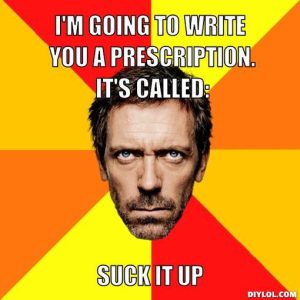
So what do we learn from all of this?
I’m sorry to say that although I am experienced in this quest for balance and have been able to speak to many questing the same, I have not found that one solid answer for “how much is too much”.
The good news is even if you’re sidelined, you don’t have to be “out”.
Once you get to that point of acceptance and make the effort to find what’s wrong, you can get to a better mental state. You can figure out the things you can do that won’t bother it and still let it heal while doing some things you enjoy. If you miss the social atmosphere of events, they are nearly always looking for volunteers. Being injured is a great time to help out at your favorite events, without feeling like you’re missing out on it as much. It can give you a chance to still be out there on course, cheering on your friends, enjoying being out in the world, and gives you a sense of accomplishment that you’re helping make something happen that all these other people enjoy doing, just like you.
What I did find after writing this piece is that “pinch of crazy” which binds us can bring us together as a small, powerful community of like-minded, all level athletes who just don’t quit. It inspires us and others to our best. It help us to overcome fears and prove to ourselves we can do what we set our minds to. Plus, we get to meet cool people and talk in code for hours. What is the water temp, anyway?
But it’s a fine line since in the same breath, our “pinch of crazy” can be what sets us back. Maybe we push through pain and convince ourselves it’s “nothing”. Maybe our fear of failure is so strong it blinds us from taking care of potential issues. These issues can eventually take us out longer than had we just got it checked out. Maybe the amount of pain we experience gets to be so much that we crash and burn then grieving the loss of our outlet.
Knowing when to come back when you’ve had to take time off is tricky too, especially if it’s something catastrophic and you’re dying to do something again. There’s a fine line between getting active again and overdoing it, setting yourself back by starting too much too soon. I don’t know that there’s a clear way of knowing that, and you just have to listen to your body, and try not to be too stubborn in the face of other knowledge. Sometimes I’ve been stubborn and returned to or pushed through something and it’s gone fine, and I’ve been thankful for the experience. Other times I’ve been stubborn and set myself back or prolonged something. I think all you can do is learn from your past (and others as much as you can) and use what tools you have as best you can every day, and in every situation that comes up, good or bad.
So we must balance ourselves carefully with honestly, compassion, and dare I say it, self-love.
I’m hoping you, the reader, feels more connected to those of us in this club. It’s not all selfies with awards and smiles at finish lines. Hopefully, if you’re struggling with pain of any kind you’ll reach out to your fellow clubmates as most of us have most likely “been there”. Use our experiences, and share yours.
Thank you Bryon C, Catherine M, Dan M, Ben R, and Marie B for your contributions. Your honesty and willingness to share is respected and appreciate

